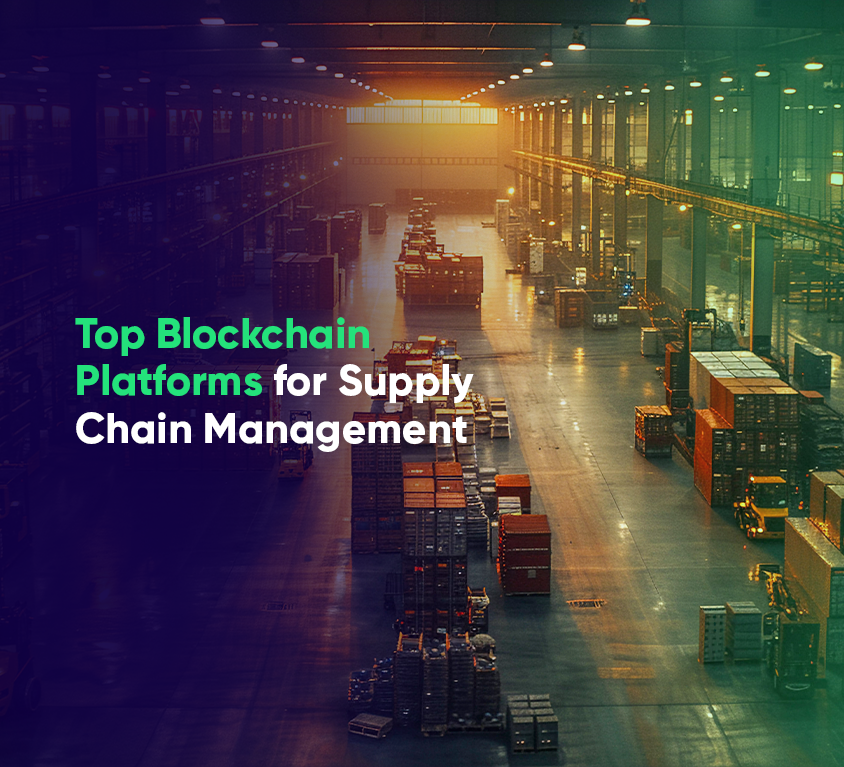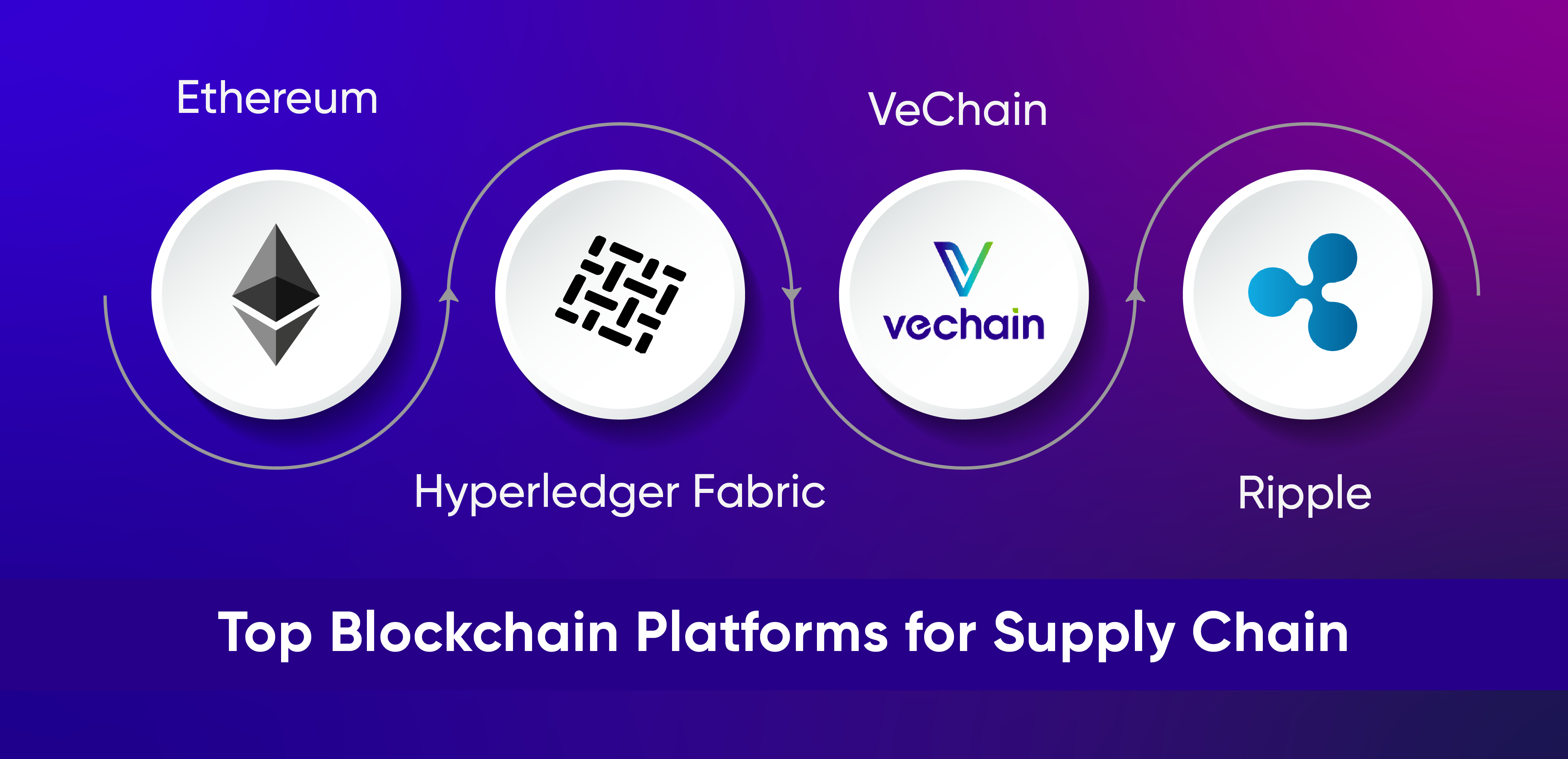
Introduction
Web3 & Blockchain Consultancy :
Top Blockchain Platforms for Supply Chain Management
The era we live in today is dominated by technology. Among all the new technological innovations, blockchain stands out as one of the most prominent, reshaping industries across the board. Originally conceived to underpin cryptocurrencies like Bitcoin, blockchain technology offers unmatched advantages such as enhanced transparency, impeccable security, and superior traceability. These features are particularly beneficial in managing complex supply chains where traditional methods often fall short.Key Takeaways
- Blockchain Platforms for Supply Chain: Blockchain platforms are digital frameworks that allow the creation and management of decentralized applications, enhancing transparency and security across various operations.
- Top Blockchain Platforms: Ethereum, Hyperledger Fabric, and VeChain stand out as leading blockchain platforms for supply chain, each caters to different aspects of supply chain management.
- Blockchain in SCM: Blockchain technology revolutionizes supply chain management by ensuring the traceability of goods, reducing fraud, and improving overall operational efficiency.
- Future Outlook: The future of blockchain in supply chain management promises greater integration with technologies like IoT and significant strides toward sustainability, driven by enhanced transparency and compliance capabilities.
Supply Chain Management and Blockchain’s Role
Supply Chain Management (SCM) is a critical component of modern business operations, involving the oversight of goods and services as they move from supplier to manufacturer to retailer, and finally to the consumer. Effective SCM requires managing a complex web of logistics, supplier relationships, and customer service interactions. The primary challenges in SCM include maintaining transparency across this intricate network, ensuring the authenticity of products, and optimizing logistics to reduce costs and improve efficiency. Traditional methods often struggle with these challenges due to the reliance on centralized systems that can become bottlenecks, lack of real-time data across all stages, and vulnerability to fraud and errors. This is where blockchain technology comes into play.Blockchain’s Transformative Role in SCM:
- Enhanced Transparency: Blockchain offers an immutable ledger that records every transaction across the supply chain. This ledger is decentralized and accessible to all stakeholders, which means that every movement of goods can be tracked transparently. This level of visibility helps reduce theft, loss, and counterfeit products.
- Increased Security: The decentralized nature of blockchain makes it highly secure against hacks and fraud. Each transaction on the blockchain is encrypted and linked to the previous transaction, making it nearly impossible to alter historical data without detection.
- Improved Traceability: Blockchain provides detailed traceability from the origin to the end consumer. This feature is especially important in industries like pharmaceuticals and food and beverage, where knowing the product history is critical for safety and compliance with regulations.
- Reduced Costs and Efficiencies: By automating many of the processes within SCM through smart contracts– self-executing contracts with the terms directly written into code—blockchain reduces the need for intermediaries, lowers transaction costs, and speeds up processing times. This automation also minimizes errors and discrepancies, leading to smoother operations.
- Building Trust: With blockchain, every stakeholder from suppliers to consumers can verify the product origins and handling processes, fostering trust in brand integrity and compliance.
Top Blockchain Platforms for Supply Chain
Learn how these blockchain platforms for supply chains are reshaping the flow of goods worldwide.
-
Ethereum
Ethereum goes beyond cryptocurrencies by offering a platform for creating decentralized applications, which are useful for managing supply chains. It uses smart contracts that automate agreements and transactions, making sure everyone involved follows the rules. This is particularly valuable in complex supply chains with many parties involved.
One practical use of Ethereum in supply chain management is demonstrated by Walmart, which used it to trace the source of its mangos quickly, reducing a process that took days to just seconds. Although Ethereum is currently addressing some challenges like slow processing times and high costs, its ability to make supply chains clearer and more efficient is undeniable.
-
Hyperledger Fabric
Hyperledger Fabric is developed by the Linux Foundation and is designed especially for businesses. It offers better privacy and lets companies set up private networks. The platform is flexible, so businesses can add or change parts as they grow.
Big companies like Honeywell Aerospace use Fabric to keep track of parts and meet legal standards, and unlike Ethereum, Fabric lets companies make private deals, which is crucial for keeping business information secret. While it’s great for managing detailed business contracts and keeping data private, it can be a bit complex to learn and set up.
-
VeChain
VeChain focuses on improving supply chain management by using smart chips and blockchain technology. These smart chips help track items accurately and securely, making sure all the information is correct and safe from tampering.
Many luxury brands use VeChain to verify their products are genuine and to fight against fake goods. VeChain uses a system called proof-of-authority (PoA) to process transactions quickly and use less energy. It’s very good at preventing counterfeiting, but because it controls everything centrally, some people who prefer fully decentralized systems might not favor it.
-
Ripple
Ripple is mainly known for its digital payment system, which is very useful for managing money in supply chains. It can complete transactions very quickly, which is great for settling payments fast in supply chains. Banks and other financial institutions use Ripple to make international payments faster and more transparent, which also helps supply chains work better across countries.
Ripple uses a special method to confirm transactions quickly, which is different from the usual mining process used by other technologies. This quick processing is a big plus, but since Ripple mainly handles money transactions, it’s not the best for tracking physical items in supply chains.
How to Implement Blockchain in Supply Chain Management
Implementing blockchain technology in supply chain management requires thoughtful planning and careful execution. Below are key steps for a successful deployment:- Identify Key Challenges: Begin by pinpointing specific issues in your current supply chain that blockchain can address effectively.
- Select an Appropriate Platform: Numerous blockchain platforms exist, each with unique capabilities. Select one that aligns with your specific needs.
- Establish Clear Use Cases: After identifying challenges and selecting a platform, outline precise use cases where blockchain can be applied within your supply chain operations.
- Engage with Stakeholders: Effective implementation of blockchain technology requires collaboration across all stakeholders in the supply chain, including suppliers, clients, and partners. Work together to ensure that the integration of blockchain into your existing systems is smooth.
- Conduct a Pilot Project: Before a full-scale rollout, conduct a pilot project with blockchain technology on limited transactions or product lines. This approach helps identify potential issues and ensures the technology’s effectiveness before broader implementation.
Impact of Blockchain on Global Supply Chains
The integration of blockchain into global supply chains has led to revolutionary changes, particularly in enhancing traceability and efficiency. Companies are now able to track a product’s journey from factory to shelf in real-time, ensuring compliance with regulatory standards and consumer expectations. Furthermore, blockchain’s inherent data integrity improves forecast accuracy and reduces the costs associated with goods’ counterfeiting and theft.Future Outlook of Blockchain in SCM
Blockchain technology is already revolutionizing supply chain management and its influence is set to grow significantly. Here’s an overview of how blockchain might further evolve within supply chain operations.-
Widespread Adoption
As the advantages of blockchain become more apparent, expect its adoption to increase throughout supply chains. This will foster a more connected and efficient network, benefitting all participants from suppliers to consumers.
-
Enhanced Integration with IoT
The Internet of Things (IoT) is prevalent in many supply chains, monitoring products and tracking performance. Integrating blockchain with IoT will enhance transparency and traceability, providing real-time, tamper-proof data across the supply chain.
-
Development of Innovative Business Models
As blockchain technology matures, it may spur the creation of novel business models within the supply chain sector. A prime example is the food industry, where platforms like IBM Food Trust use blockchain to enhance the transparency and traceability of food products. This not only helps in managing the safety and quality of food but also streamlines the process of identifying and removing contaminated items, thereby reducing the incidence of foodborne diseases and the severity of food recalls.